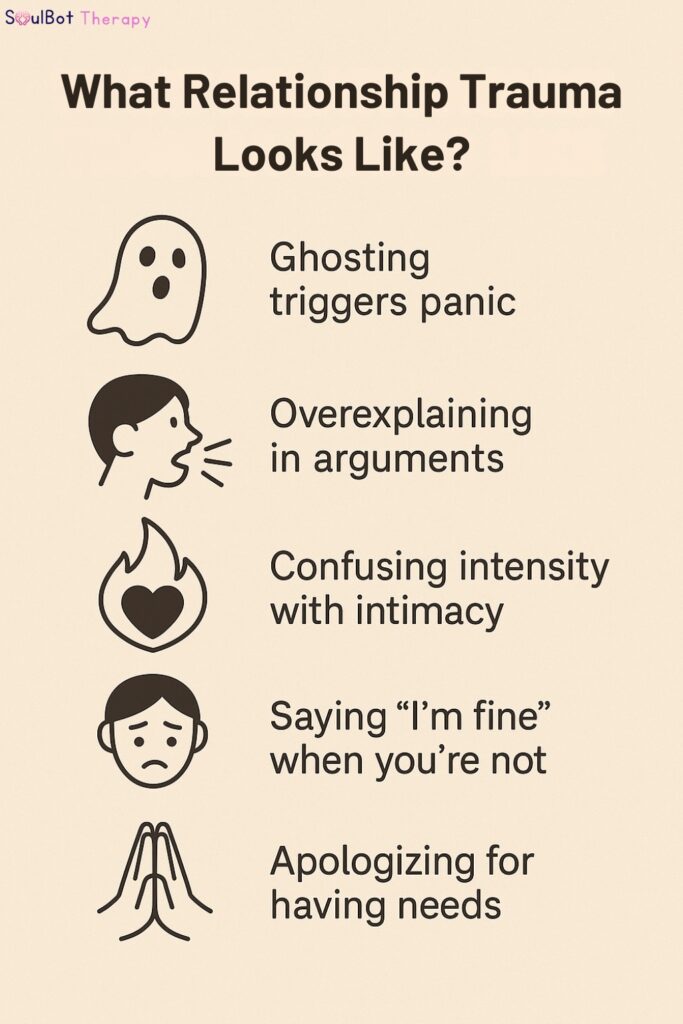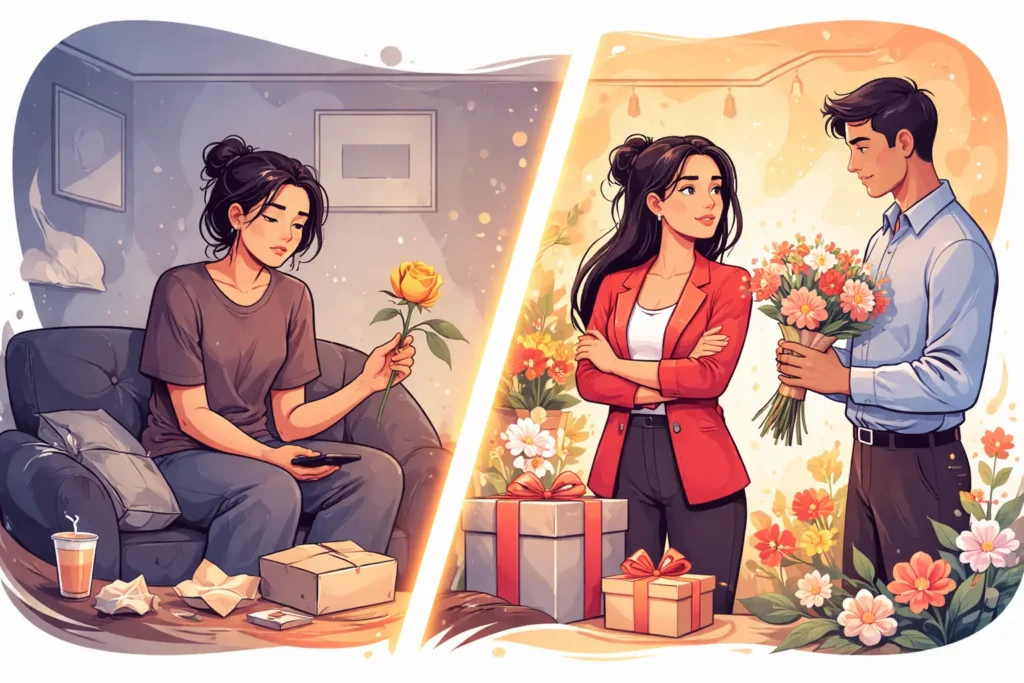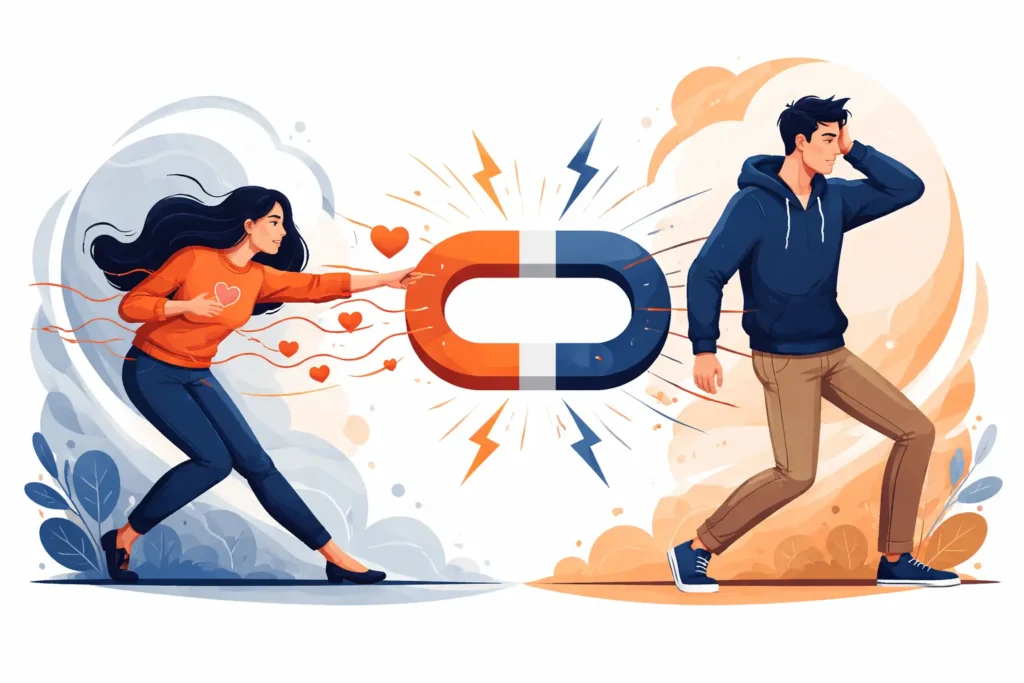“Why do I always sabotage relationships?”
You’re sweet. Empathetic. You want a real connection. But the moment things feel too close or too quiet, you either cling, shut down, or pick a fight. This isn’t just your personality.
It might be relationship trauma quietly guiding how you love, fight, and fear intimacy.
What Is Relationship Trauma?
Relationship trauma is the emotional scar tissue left behind by repeated unsafe, manipulative, or neglectful relationship experiences. These wounds can form during the following:
- Romantic relationships (e.g., toxic cycles, abandonment, betrayal)
- Early caregiving (e.g., neglect, conditional love, invalidation)
- Past friendships or authority figures (e.g., gaslighting, shaming)
Over time, your nervous system rewires to keep you emotionally safe.
But safety often looks like distance, overthinking, or emotional shutdown — even when the threat is long gone.
🟢 Want to explore if you’ve been affected by emotional abandonment?
Read: 7 Hidden Signs of Low Self-Worth
How Relationship Trauma Affects Attachment Styles
Your brain builds its idea of love based on the emotional templates you grew up with.
Let’s break down how trauma often leads to common attachment styles in relationships:
🔒 Avoidant Attachment
- You’re fiercely independent.
- You keep people at arm’s length.
- Emotions feel unsafe — even annoying.
- You ghost to protect yourself.
Why? Because love used to feel overwhelming or smothering.
Avoidance became your protection.
Fact Check: According to Medical News Today, individuals struggling to let go of the past may experience rumination, a tendency to dwell excessively on the same thoughts, which is common in several mental health conditions, including depression, obsessive-compulsive disorder, generalized anxiety disorder, and post-traumatic stress disorder (PTSD).
😰 Anxious Attachment
- You overthink texts.
- You panic when they take too long to reply.
- You feel “too much” but can’t stop chasing.
You’re not clingy. You just learned that love disappears easily, so you fight hard to keep it around.
❄️ Disorganised (Fearful-Avoidant)
- You want closeness but panic when you get it.
- You flip between loving too hard and ghosting.
- Your emotions feel like a war zone.
This style often stems from relational trauma that taught you:
“People I love also hurt me.”
🟠 Want to break this cycle?
Try: Setting Healthy Boundaries in Relationships
Start small. Start honestly. Start with you.
Real-Life Signs of Unhealed Relationship Trauma
- You fall for emotionally unavailable people
- You replay toxic patterns and call it “chemistry.”
- You stay too long, or leave too soon
- You fear abandonment more than loneliness
- You feel numb or disconnected during intimacy
- You don’t trust love to last
If that feels familiar… pause. Breathe. You’re not broken.
You’re responding the way you were trained to survive.
Why Are Anxious and Avoidant People Magnetically Attracted?
This is trauma bonding in action.
- Anxious partners want closeness. Avoidant partners need space.
- One overfunctions. One shuts down.
Together, they re-enact the dance of “almost love” — the very kind many of us grew up seeing.

Can You Heal Relationship Trauma?
Yes. 100%.
But healing is not about fixing yourself — it’s about finding safety in your body, boundaries, and beliefs.
Here’s how healing often begins:
- 🌿 Learning your patterns without judgment
- 🧠 Naming your attachment style
- 💬 Journaling with tools like SoulBot to track triggers
- ❤️ Choosing emotionally safe people
- 🔁 Repeating safer emotional experiences (until safety feels normal)
✨ Want to discover your attachment blueprint?
👉 Take the Attachment Style Quiz (coming soon)
💬 How SoulBot Supports Your Healing Journey
Healing takes small, consistent reflection, not perfect therapy sessions.
🧠 SoulBot offers:
- Judgment-free journaling after tough conversations
- Emotional pattern tracking
- Prompts to reflect on triggers and trauma
- Relationship coaching insights based on attachment behaviours
You don’t have to share everything with someone else to start healing.
Sometimes, your first safe relationship is with yourself, and SoulBot can help you achieve this.
📚 Related Blogs to Explore
🔗 Am I Gay? 7 Real Signs You’re Questioning Your Sexuality
🔗Attachment Styles in Relationships: What Yours Says About You
🔗 What Is Emotional Numbness? Signs You Might Be Experiencing It
❤️ Final Thought
- You’re not too damaged to love.
- You’re not too complicated to heal.
- You’re just carrying hurt that was never yours to begin with.
🔸 Talk to SoulBot Today – Your AI Mental Health Companion
🔸 Save this blog or share it with someone navigating relationship wounds








